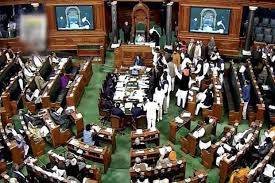Article 108 of the Indian Constitution plays a crucial role in resolving legislative deadlocks between the two houses of Parliament, namely the Lok Sabha and the Rajya Sabha. This provision enables a joint sitting of both houses to convene, ensuring that important matters such as the passage of ordinary legislation can be addressed effectively.

Article 108 of the Indian Constitution outlines the procedure for the joint sitting of both houses of Parliament. It states that in the event of a deadlock between the Lok Sabha and the Rajya Sabha over the passage of a bill (except money bills, Constitutional Amendment Bills), the President of India has the authority to summon a joint sitting of both houses. This joint sitting is presided over by the Speaker of the Lok Sabha or, in their absence, the Deputy Speaker or any other member of the Lok Sabha designated by the President.
Resolving Deadlocks
The purpose of convening a joint sitting is to break the impasse between the two houses and facilitate the passage of crucial legislation. In such cases, both the Lok Sabha and the Rajya Sabha assemble together in the same chamber. Each member has one vote, regardless of the house they belong to. The bill is put to vote, and if a majority of the total members present and voting approve it, the bill is considered passed.
Scope of Joint Sittings
Article 108 is applicable to ordinary legislation. In the case of ordinary legislation, if a bill is passed by one house and rejected or not passed by the other, or if the two houses have disagreed on amendments proposed by either house, a joint sitting can be convened to break the deadlock. This provision ensures that important bills are not indefinitely delayed due to differences between the houses.
Article 108 of the Indian Constitution serves as a crucial mechanism to resolve legislative deadlocks and ensure the smooth functioning of the parliamentary system. By providing for joint sittings of both houses, this provision facilitates the passage of important bills.
Important Links